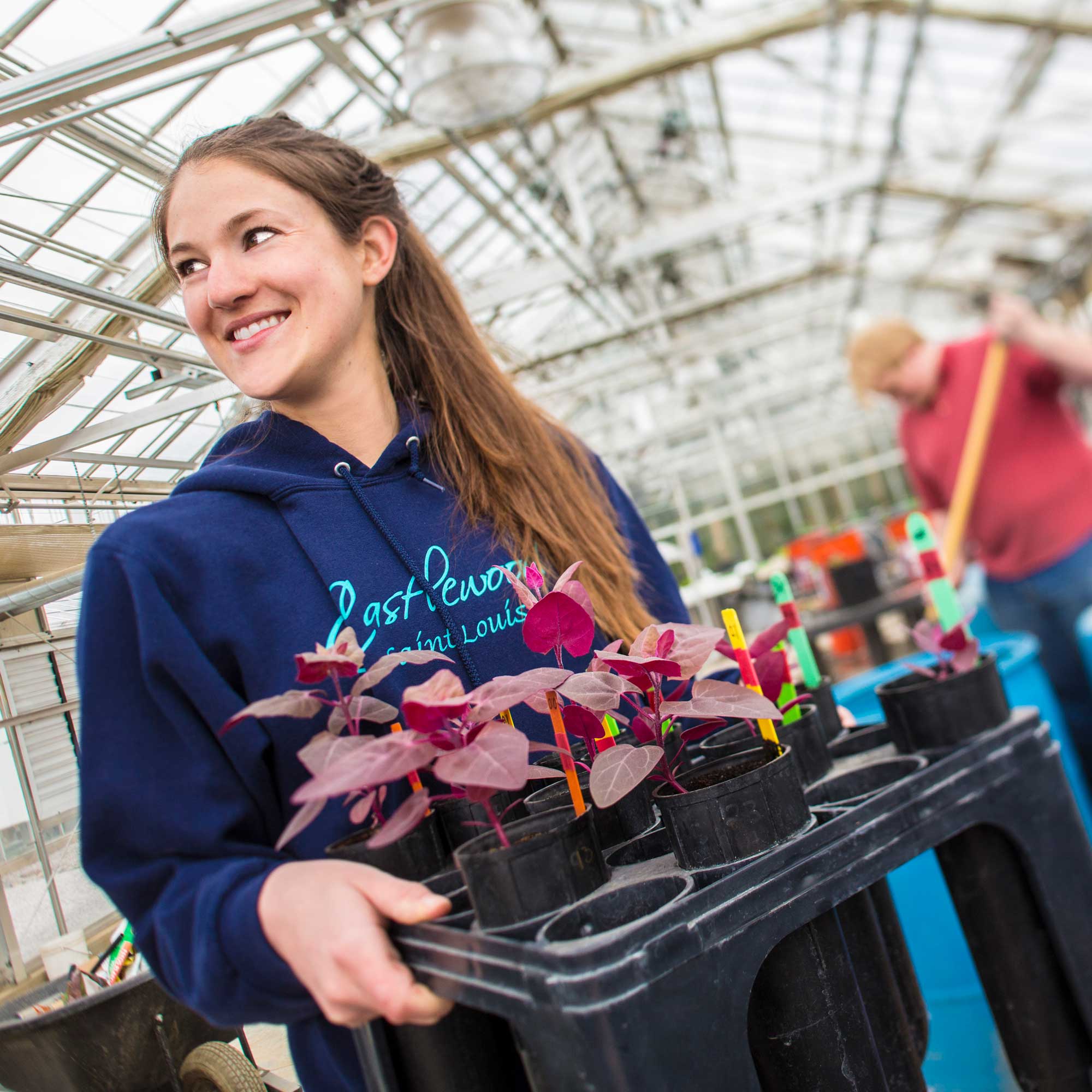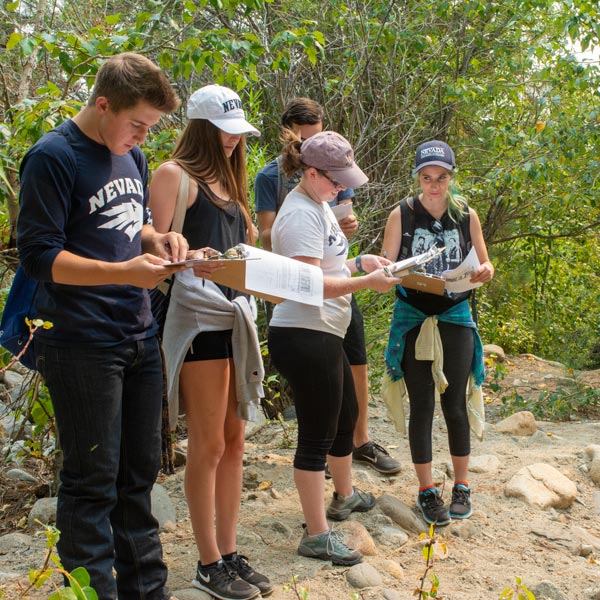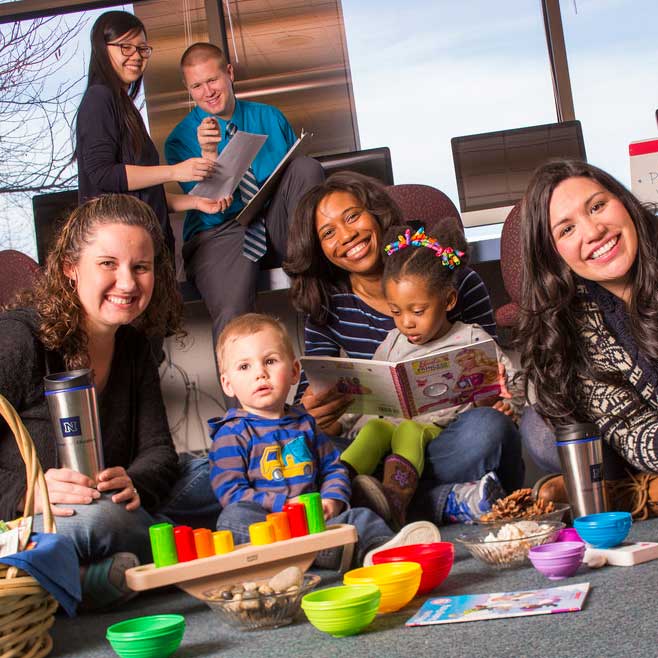In this edition
- Serving our community, advancing the public good
- Experiment Station projects serve Nevadans at facilities throughout state
- Extension offers trainings to help address state’s high suicide rates among youth
- New pre-med biochemistry and molecular biology emphasis offered
- On the lookout for baby food that does no harm
About our College
A founding college of the University, we have a long tradition of excellence in teaching, research and engagement programs that benefit the health and economic vitality of Nevada. We offer programs in:
- agriculture, horticulture, rangeland & veterinary sciences
- biochemistry & molecular biology
- children, youth & families
- community & economic development
- health & nutrition
- natural resources & environmental science
Serving our community, advancing the public good
Through education, research and outreach our University fulfills its land-grant mission to the betterment of humanity, the environment and, of course, Nevada

The Morrill Act of 1862 was signed into law by President Abraham Lincoln and provided for a land-grant institution in each state of the Union. Founded in 1874, our University was established as Nevada’s land-grant institution. Morrill Hall, constructed in 1885, originally housed the entire University.
"The land-grant mission for the University has never been more timely than right now," University President Brian Sandoval said. "With the pandemic, we are looking at an unprecedented event that has shaken the world and our country to their cores. Resources are limited as we re-set our economy and strive for societal justice.”
Simply put, land grant began as a way to bring higher education to everyday citizens through practical curriculum such as agriculture, mining and “mechanical arts.” It has evolved into a 21st-century approach to the land-grant mission, which encompasses the University’s goals to improve the lives of Nevadans through teaching, research and outreach.
The pavement Nevadans drive on, the affordable health clinics in rural Nevada, programs to inform and help farmers and ranchers, research that helps the mining industry, geothermal exploration for new energy in Nevada, nutrition programs for families, business economic development bringing industry and jobs to Nevada – all these programs and much more are all now part of the land-grant mission that brought the University to life 147 years ago.
After the country was founded, the federal government took a series of steps to use grants of land to promote westward expansion, education and economic development. It involved the taking of a great deal of Native American land.
Serving Nevada communities
"We were founded to serve our community, the State of Nevada. In 2021, serving our community remains a foundational underpinning of everything that we do. Our commitment to the land grant is so important because as we help solve our state’s economic and social challenges, we are representative in every possible way of the experiences, backgrounds and aspirations of every single Nevadan." -President Brian Sandoval
Experiment Station projects serve Nevadans at facilities throughout state
Facilities provide opportunities for studies to help communities in Nevada, the U.S. and the world
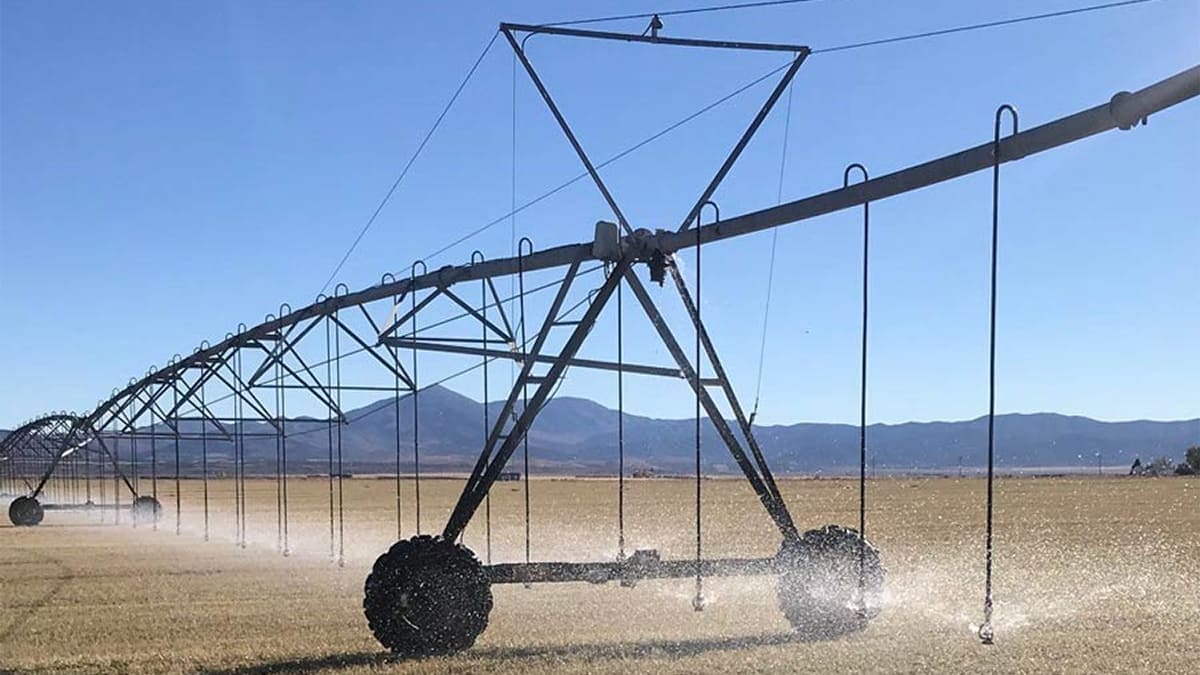
At the Experiment Station’s Great Basin Research & Extension Center, researchers are using a variable rate irrigation system to investigate sorghum’s response to different watering levels. The study is part of a larger project spanning two additional Experiment Station facilities. Photo by Gary McCuin.
At a ranch in Eureka, researchers are breeding a unique species of sheep well-adapted to the harsh Great Basin environment and that produces some of the finest wool in the nation. At the same time at a field in Fallon, researchers are using lasers and belowground radar to study how well sorghum grows with different levels of flood irrigation. And at a lab in Logandale, researchers just finished a study on how cactus pear can be grown as a commercial crop to fuel vehicles and feed both animals and people. These are just three of many projects happening at Experiment Station facilities across Nevada.
The Experiment Station is the research unit of our College. It maintains a network of field stations throughout the state, providing researchers different environments where they can experiment on a larger scale while supporting the needs of the nearby communities.
Expanding research for Nevada
"I think it’s really an exciting time for the Experiment Station, as our research is expanding throughout the state and our faculty are heavily engaged in projects that will serve to help our stakeholders in all areas of Nevada." -Experiment Station Director & Associate Dean for Research Chris Pritsos
Extension offers trainings to help address state’s high suicide rates among youth
4-H Program to provide additional trainings in communities

The 4-H Youth Development Program trained faculty and staff on how to identify warning signs, and question, persuade and refer youth who may be at risk for suicide.
Suicide is the second leading cause of death for ages 10 to 34 in the state. To help address this, Extension’s 4-H Youth Development Program recently conducted a training for 15 faculty and staff members to teach them steps they can take to help prevent suicides, especially among Nevada’s youth.
The program will offer “train-the-trainer” sessions this summer, so that Extension staff will be able to provide the training for others.
“The more people in the community who understand what the warning signs and prevention techniques for suicide risk are, the lower the suicide rates in that community become," Carrie Stark, Nevada 4-H program director, said. "Extension can light a spark in communities to help provide mental health support for our youth, and save some lives.”
Growing leadership, citizenship and life skills
4-H is a community of young people across America. Members learn life skills, make new friends, enhance self-esteem, achieve personal goals, develop positive relationships with peers and volunteers, and have fun learning and sharing as a family and a club.
New pre-med biochemistry and molecular biology emphasis offered
New emphasis provides training for students pursuing professional medical school
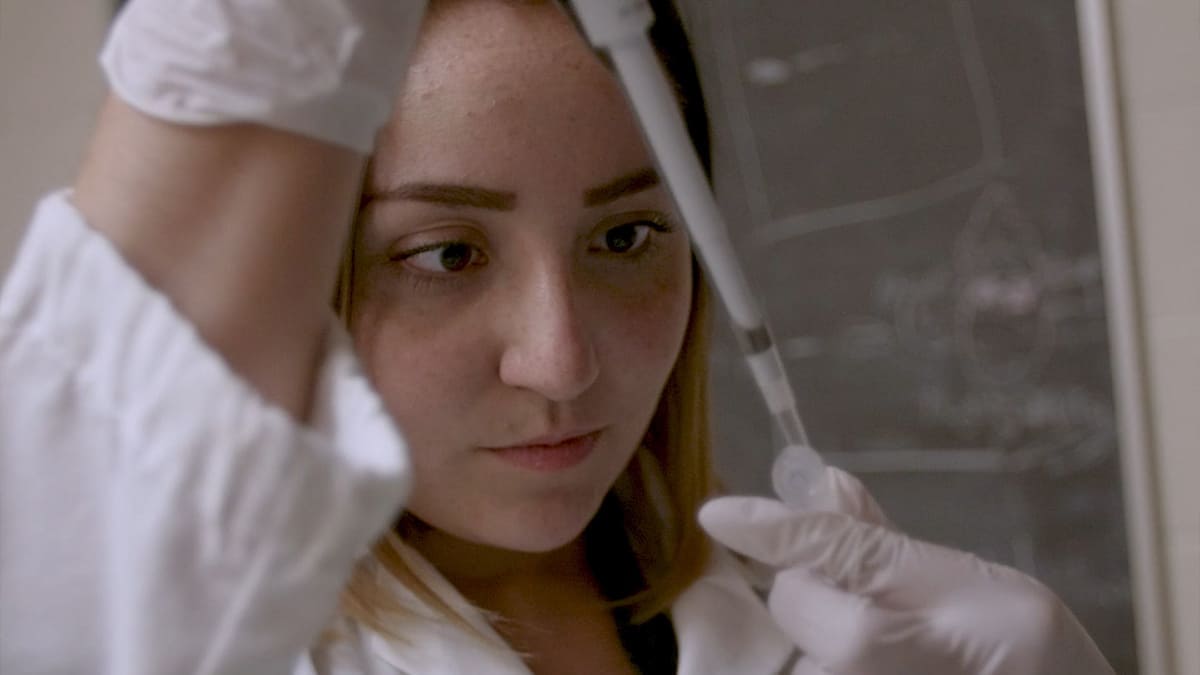
A new biochemistry and molecular biology emphasis prepares students to enter professional school for a medical career.
The University launched a new pre-med emphasis for undergraduates in biochemistry and molecular biology designed to prepare students to attend professional school, including medical, dental, pharmacy and optometry. The new emphasis is part of our College's bachelor’s degree in biochemistry and molecular biology. It is offered by our Department of Biochemistry & Molecular Biology.
Preparing pre-med students for success
"Biochemistry & Molecular Biology has traditionally been an exceptional degree program for students who are planning to pursue a doctorate in a health care field. The program offers a mix of great teaching in lectures and labs as well as hands-on research opportunities. This new emphasis makes it easier for pre-med students to get the preparation they need to do well on the MCAT and in medical school." -Professor & Department Chair Bob Ryan
On the lookout for baby food that does no harm
What we can do to ensure our babies get the most wholesome food
Aurora Buffington
 Children, especially babies, are small and rapidly undergoing growth and development, which makes them especially vulnerable to the effects of heavy metal exposure. Internal documents from four of the seven major baby food manufacturers revealed that baby food containing heavy metals was allowed into the food supply.
Children, especially babies, are small and rapidly undergoing growth and development, which makes them especially vulnerable to the effects of heavy metal exposure. Internal documents from four of the seven major baby food manufacturers revealed that baby food containing heavy metals was allowed into the food supply.
I recently became an abuelita, which is the affectionate Spanish term used for grandmother, so I care greatly about what my sweet little twin grandbabies eat. Of course, being a dietitian and a public health professional also factor into my reasons for caring about our food supply, so one can only imagine my concern about a recently released Congressional report titled, Baby Foods Are Tainted with Dangerous Levels of Arsenic, Lead, Cadmium, and Mercury.
You may wonder how arsenic, lead, cadmium and mercury make their way into baby food. A couple of possibilities include the raw ingredients used or the ingredients added by the baby food manufacturer. It is also important to recognize that heavy metal exposure isn't limited to what we eat or drink, it also includes environmental and occupational exposure.
The recommendations contained in the report call for changes to reduce exposure to toxic elements in food. In the meanwhile, what can we do to ensure our babies get the most wholesome food? We can make our own baby food and add variety to our babies' diets.
Inspiring better nutrition for babies
"It brings me so much joy to watch my twin grandbabies’ expressions as they try new foods, and peace of mind about the safety of the foods they eat is priceless! If you are inspired learn more about toddler or preschooler nutrition, check out Extension’s Healthy Kids Resource Center Nutrition Toolbox." -Assistant Professor Aurora Buffington
Growing a stronger Nevada
Our programs work together to make an impact
Our teaching, research and engagement programs are intertwined and complement one another. Faculty who teach on campus also conduct research as part of our Experiment Station, allowing students to learn about and participate in research. Extension faculty engaging with communities identify research needs, as well as join Experiment Station faculty to conduct research. Faculty on campus help to develop Extension programs in communities.
